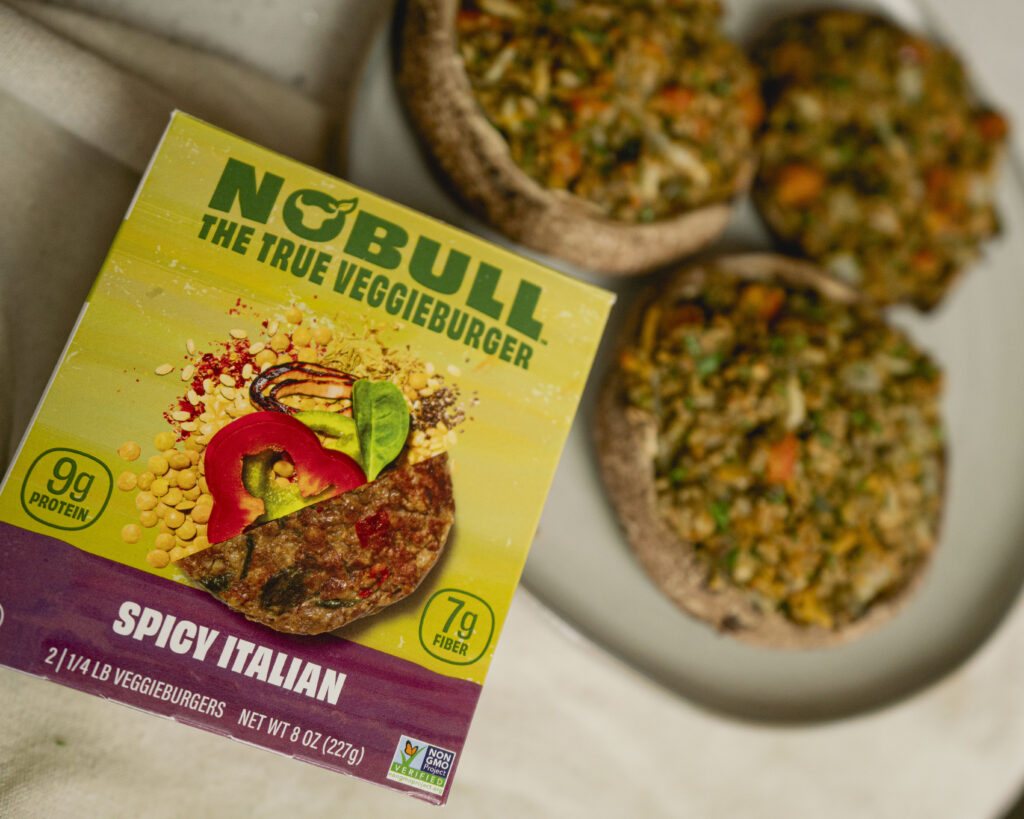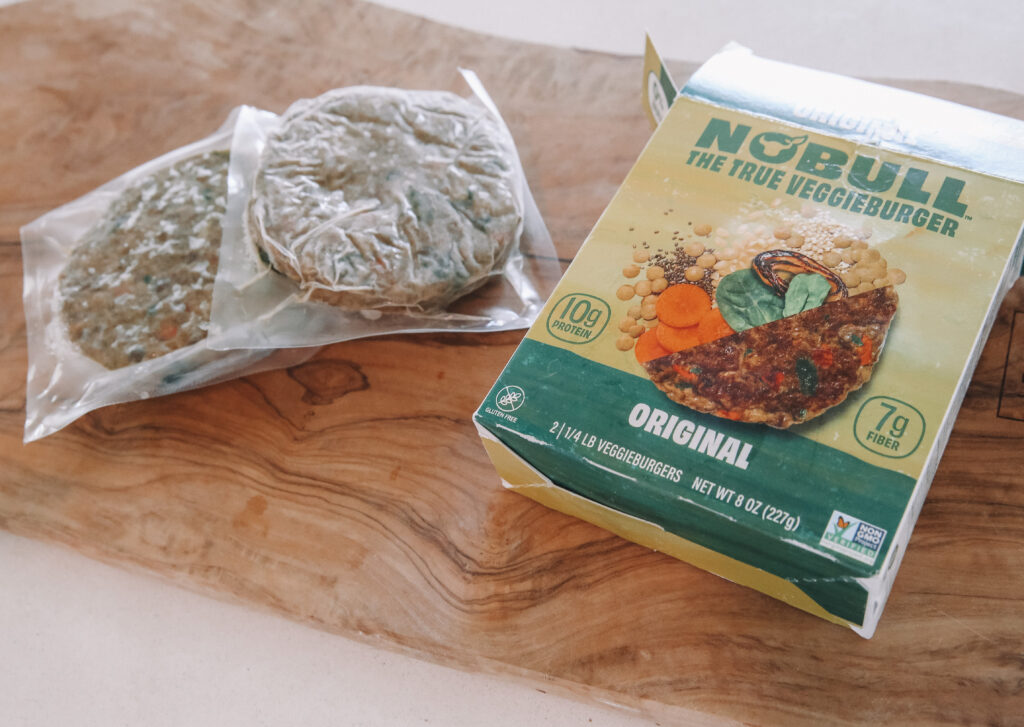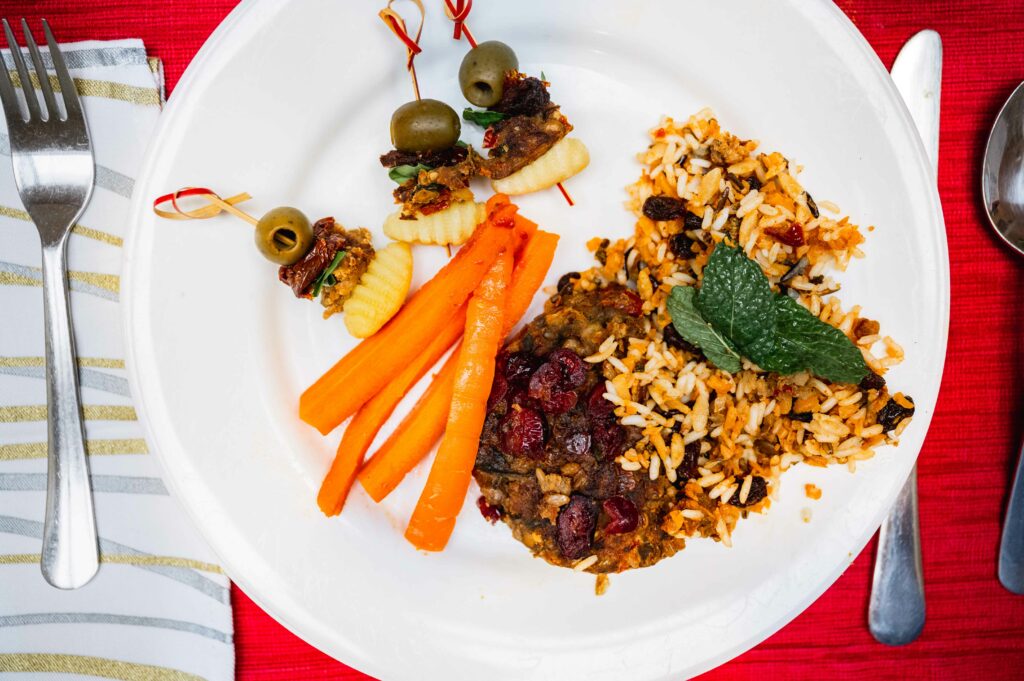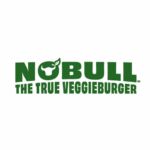Wondering which veggieburger brand to choose? There are so many options that knowing which veggieburger is actually healthy, and that tastes great, is definitely a chore if you don’t know where to start!
In this article, we’re going to compare 3 of “the other guys” (meaning, top leading veggieburger brands) with NoBull Burgers. We’ll compare the ingredients, nutrition info and taste.
We hope this helps you learn more about reading labels and knowing which brands have your best health interests at heart!
Why eat veggie burgers in the first place?
It’s incredibly easy these days to switch to a plant-based or flexitarian diet, but that also means there are a lot of options to dig through when it comes to plant-based products.
Taking just one day per week to cut out meat can make a huge impact on your physical health, mental health, and the environment. However, if you’re going to get these benefits, you need to buy the right veggieburgers. Looking for brands that use clean, nutritious ingredients only is key to improving your health and that of the environment – because processing of ingredients is also harmful to both.
Incorporating the right kind of plant-based foods and ingredients into your diet helps with:
- Lowering blood pressure and cholesterol
- Preventing diseases like heart disease, cancer and diabetes
- Reducing inflammation
- Improved mental health for the whole family
What to look for in ingredient lists for veggieburgers
You can learn a lot about a veggieburger just by reading the ingredients! The ingredient list can tell you about:
- Known and potentially harmful chemicals
- If the product contains ultra-processed ingredients and things like man-made vitamins
- Potential allergens
Harmful and potentially harmful ingredients include:
Methylcellulose
Methylcellulose is a synthetically-produced compound of cellulose that comes from plants, but isn’t digestible because the cellulase has been removed, which the human body doesn’t have.
Methylcellulose is not recognized by the immune system and can cause inflammation if you eat too much. It’s traditionally used in laxatives because of this. While a small amount may not be harmful, when you’re eating other processed foods and ingredients in addition to this, it’s only adding to the stack of harmful, inflammatory ingredients.
Natural flavors
You probably see the words “natural flavors” on a lot of packaging; that’s because it’s a really common ingredient. However, this is a red flag because it equals ultra-processing.
Heat, and sometimes enzymes are used to extract flavor from natural sources to be added as ingredients. The manufacturing process adds synthetic chemicals that can be harmful – the Environmental Working Group says the vast majority of “natural flavors” can have over 100 chemicals including solvents, emulsifiers, preservatives and more.
The US has no requirements for what can constitute the term “natural” on food labels, which means when you see that word, it’s likely to be misleading.
Juices from concentrate
While some juices from concentrate are healthy, many contain added sugars and preservatives. If you don’t know the full information, you may be consuming ultra-processed chemicals – and the more you see in the ingredients list, the more you’re consuming in the product.
Added vitamins and minerals
Vitamins and minerals are added into many foods to help the general public avoid malnutrition. While this has been proven to prevent related diseases, it’s definitely best to get nutrition directly from the whole food sources, rather than fortified products.
- Potential allergens and food sensitivities include:
Legumes
Legumes are a family of plants, and some people may be allergic to certain legumes. Here they are, in descending order of the prevalence of allergies:
- Peanut
- Soybean
- Lentil
- Chickpea
- Pea
- Mung bean
- Red gram
Other common allergens to watch out for include gluten, wheat, dairy and corn.
Ingredient Comparison
Leading Brand 1:
Water, pea protein, expeller-pressed canola oil, refined coconut oil, rice protein, natural flavors, dried yeast, cocoa butter, methylcellulose, and less than 1% of potato starch, salt, potassium chloride, beet juice color, apple extract, pomegranate concentrate, sunflower lecithin, vinegar, lemon juice concentrate, vitamins and minerals (zinc sulfate, niacinamide [vitamin B3], pyridoxine hydrochloride [vitamin B6], cyanocobalamin [vitamin B12], calcium pantothenate).
Leading Brand 2:
Water, Soy Protein Concentrate, Sunflower Oil, Coconut Oil, Natural Flavors, 2% Or Less Of: Methylcellulose, Cultured Dextrose, Food Starch Modified, Yeast Extract, Soy Leghemoglobin, Salt, Mixed Tocopherols (Antioxidant), L-tryptophan, Soy Protein Isolate
Leading Brand 3:
Carrots, Onions, String Beans, Oat Bran, Soybeans, Zucchini, Peas, Broccoli, Corn, Soy Flour, Spinach, Expeller Pressed Canola Oil, Red Peppers, Arrowroot, Corn Starch, Garlic, Corn Meal, Salt, Parsley, Black Pepper
NoBull Burger:
Organic Green Lentils, Organic Brown Rice, Organic Carrots, Onions, Organic Spinach, Non-GMO Wheat-Free Tamari, Organic Quinoa, Chickpea Flour, Chickpea Protein, Water, Organic Chia Seed
Nutrition: What to look for
When it comes to nutrition, the labels only say so much. Knowing that a product has 10 grams of total fat, for example, doesn’t tell you where that comes from. When it comes to carbs, those can come from vegetables or grains, so you’ll need to look at nutrition labels with the ingredient list before making your choice.
Nutrition Information Comparison
| Total Fat | Saturated Fat | Sodium | Total Carbs | Dietary Fiber | Total Sugars | Added Sugars | Protein | |
| Leading Brand 1 | 14g | 5g | 390mg | 7g | 2g | 0g | 0g | 20g |
| Leading Brand 2 | 13g | 6g | 370mg | 9g | 5g | <1g | <1g | 19g |
| Leading Brand 3 | 6g | 0.5g | 250mg | 13g | 5g | 1g | 0g | 5g |
| NoBull Burger | 2.5g | 0g | 340mg | 32g | 7g | 2g | 0g | 10g |
Taste & Versatility
Of course, taste is all-important besides nutrition, when making a decision on which veggieburger you’re going to buy again and again – and it’s up to you to decide that! While that process is up to you, we’re going to tell you why NoBull Burgers are the most versatile burger, while having great taste and making up a complete protein (from the brown rice and lentils combined).
NoBull Burger has five flavors you can choose from, and we’re not trying to mimic a meat-based burger; we’re trying to be our own, great-tasting food that you can eat like a burger, or mix in with recipes to make plant-based eating a no-brainer, saving you time in the kitchen!
Our five flavors each have some variation in the ingredients and nutrition information, but the base of all of them is the same! We’re listing them all here, so you can learn more about whatever flavor you’re most interested in (and to get meal ideas):
- NoBull Original: Goes with everything! Great to pair with your favorite condiments, salad dressing or BBQ sauce, and has 10g of protein
- NoBull Savory Mushroom: Goes great with a sharp vegan cheese or Swiss, caramelized mushrooms and a spicy Dijon, and has 8g of protein
- NoBull Sundried Tomato: Pairs fabulously with a great pesto and vegan mozzarella or over a bed of mixed greens with balsamic vinaigrette, and has 9g of protein
- NoBull Spicy Italian: Goes deliciously with your favorite marinara sauce, vegan mozzarella over zucchini noodles, pasta or in a hearty sub, and has 8g of protein
- NoBull Madras Curry: Pairs great with your favorite chutney or a yogurt sauce or aioli, and has 11g of protein
Try NoBull Burger and Compare for yourself!
We’re not here to just tell you that NoBull Burgers have great taste; we’d rather you try them for yourself!
You can purchase all of our five flavors online, or find us in a store near you. See for yourself what a difference it makes to eat a veggie burger made with clean, whole-plant ingredients as close to the earth as possible!
